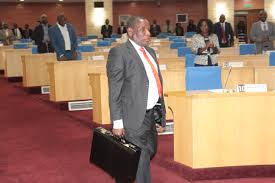By Gilbert MOYO
Minister of Finance, Economic Planning and Development Joseph Mwanamvekha presented the K1.7 Trillion budget to Parliament last month.
From the budget statement, I have noted that the budget prioritises cotton and legume production which have been allocated K1 billion and K1.85 Billion, respectively.
Are these the only crops at the heart of government agenda?
However, sugar cane has conspicuously been denied a slice of the national cake. Why? I have no answer. This year again, sugar cane has no support in the national budget even though the National Export Strategy of 2013-2018 identified this as a priority crop for export.

Similarly, the proposed National Export Strategy II touts sugar cane as a priority crop together with legumes.During the review of the expired export strategy, participants noted that the blueprint had several challenges inhibiting its success.
One of the bottlenecks was inadequate funding from government to drive the strategy. The implementation of the export strategy was at the mercy of development partners.
If government does not allocate adequate funds for sugar, sugar cane products and other priority activities in the national strategy, who will do so?
In 2011, exports from sugar cane products reached four percent of the country’s total exports, only third to tobacco and tea.However, for many years, it has been confined to two districts—Chikwawa and Nkhotakota—unlike other crops.
Sugar cane’s contribution to the national economy is derived from sugar and ethanol. In Brazil, India, Mauritius and other countries that are serious with sugar cane production, no single part of the crop goes to waste. Every part has value; it is a raw material for another product.These countries have heavily invested in research and development to make sugar cane a high-value crop.
They produce a cocktail of products from sugar cane, including fertiliser, electricity, plastics and carbon dioxide.
In fact, this is exactly what the National Export Strategy intended to achieve. The brains behind the strategy envisioned sugar cane production producing sugar, syrups, sweets, caramel, sweetener, ethanol, spirits, cane juice, fertiliser, animal feed, electricity, cosmetics and many more.
One of the major challenges slowing sugar cane production in Malawi is lack of extension services. Smallholder farmers grow sugar cane without technical support. These extension officers are not available simply because local universities do not extensively teach anything about sugar cane.
If government is serious about promoting sugarcane, it must seriously consider allocating funds in the 2019/20 National Budget to support the promotion of sugarcane production.The funds will help develop a team of specialists who should be providing extension services in sugar cane production.In the end, this will improve productivity and reduce poverty among the farmers.
Currently, there is growing interest in sugar cane value chain. That is why we have a new factory in Salima where smallholder growers have already started producing and supplying sugar cane.
These are the farmers who need appropriate extension services in sustainable and productive sugar cane farming.
I hope members of Parliament from sugar cane-growing districts of Nkhotakota, Salima and Chikwawa will lobby the Ministry of Finance, Economic Planning and Development for a slice of the cake to go towards promoting the crop their constituents grow for industrial use.
Some of these legislators are actually sugar cane farmers, so they are aware of what the cane farmers are going through.
This is why they need to act now.



